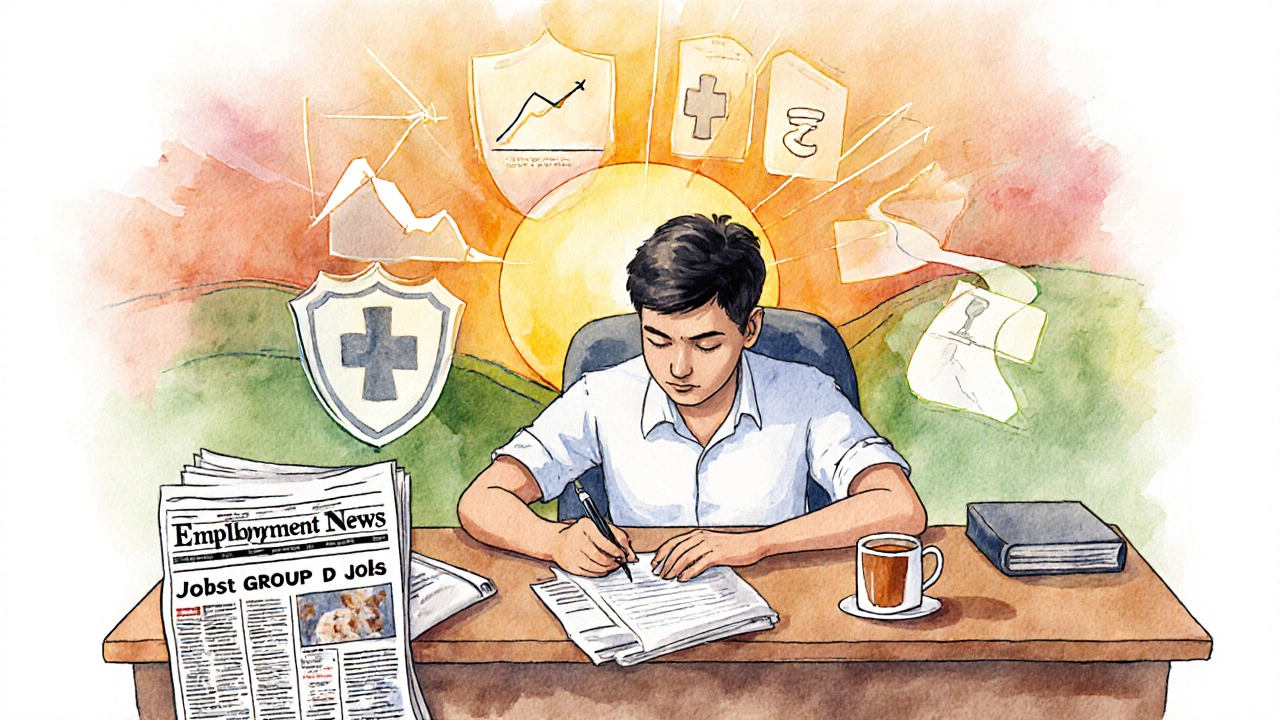Lowest Paying Federal Government Job in India - Salary, Roles & Application Guide

Government Salary Calculator
Calculate Your Take-Home Salary
See how your base salary of ₹18,000 transforms into take-home pay based on location and allowances. All Group D positions start at this base level but vary in actual take-home pay.
Estimated Take-Home Salary
₹18,000Key Takeaways
Your actual salary will vary based on location. The Peon/Watch & Ward role typically has the lowest take-home pay due to minimal allowances. Note that your salary increases annually by approximately 3%.
Source: Pay Band 1 structure as per 7th Central Pay Commission (2024)
Ever wondered which post in the Indian central government pays the least? While most aspirants chase the high‑profile services, there’s a whole tier of jobs that start with a modest paycheck. Understanding the bottom of the pay scale helps you set realistic expectations, weigh the benefits that come with a government bench, and decide if a low‑salary entry point is worth the stability it offers.
How the Indian central government structures salaries
The government follows a pay‑matrix called the Pay Band 1 the lowest salary band for Group D staff, ranging from ₹18,000 to ₹56,900 per month (2024 figures). Every employee is slotted into a band and a corresponding grade, known as a ‘Level’. The system was overhauled under the 7th Central Pay Commission, but the basic hierarchy remains:
- Group A - top‑tier officers (IAS, IPS, IFS)
- Group B - senior executives and gazetted officers
- Group C - non‑gazetted officials and clerical staff
- Group D the entry‑level cadre covering unskilled or semi‑skilled posts - the focus of this article
Within Group D, the salary is fixed by the Pay Band 1 scale, and each progression step adds an annual increment of about 3%.
What qualifies as the lowest paying job?
The title “lowest paying” can be misleading if you look only at the basic pay. The government adds several allowances - Dearness Allowance (DA), House Rent Allowance (HRA), and transport subsidies - that boost the take‑home amount. However, the base figure for a lowest paying federal government job stays the same across all Group D roles. In practice, the role with the smallest set of allowances (usually those posted in non‑metro locations) ends up with the lowest net salary.
Typical Group D posts that sit at the bottom
| Post | Basic Pay (₹/month) | Primary Duties | Eligibility |
|---|---|---|---|
| Clerical Assistant (CGO‑I) | 18,000 | Maintain records, handle correspondence, basic data entry | 10+2 with 45% in each subject |
| Peon/Watch & Ward (PW‑I) | 18,000 | Maintain premises, deliver documents, basic security | 10+2 |
| Stenographer (S‑II) | 20,200 | Transcribe speeches, type official letters, maintain minutes | 10+2 with typing speed ≥40wpm |
| Junior Engineer (JE‑I) - limited cadre | 22,400 | Assist senior engineers, supervise minor projects | Diploma in Engineering (10+2+3) |
All these positions share the same entry‑level pay band, but the Peon/Watch & Ward role often ends up with the smallest allowances because most postings are outside metro areas where HRA is lower.

Beyond the paycheck - perks that balance the low pay
Even the smallest government salary comes with a safety net that private jobs rarely match:
- Job security - dismissals are rare unless for misconduct.
- Pension - a defined benefit scheme that starts after 20years of service.
- Medical facilities - free or subsidised treatment at government hospitals.
- Leave - 30days paid annual leave plus festive holidays.
- Promotions - regular exams (UPSC) enable movement into higher pay bands.
These benefits mean the net financial picture isn’t as bleak as the base salary suggests.
How to apply for a Group D position
The recruitment channel is overseen by the Union Public Service Commission (UPSC) India’s central recruiting agency for civil services and Group D posts. The steps are straightforward:
- Watch the weekly Employment News or the official UPSC website for notifications.
- Download the application form (usually a PDF) and fill it offline.
- Pay the application fee online - ₹500 for general category, ₹250 for SC/ST.
- Submit the form at the designated post office before the deadline.
- Prepare for the written test - mostly general awareness, reasoning, and basic math.
- If you clear the exam, appear for the interview or skill test, depending on the post.
- Upon selection, you’ll receive a joining letter and undergo a medical check‑up.
Because eligibility is minimal, many aspirants from rural backgrounds consider these jobs a stepping stone into the bureaucracy.

Common misconceptions about the lowest paying job
1. “It’s not worth it because the salary is tiny.” - The answer depends on your priorities. For those seeking stability, regular increments, and a pension, the net value can surpass private sector entry‑level offers.
2. “You can’t move up.” - Group D staff can appear for the Staff Selection Commission (SSC) exams to shift to Group C or even Group B roles.
3. “All postings are in remote areas.” - While many initial assignments are in smaller towns, transfers to metros happen after a few years, boosting HRA.
Quick reference checklist
- Identify the exact post (Clerical Assistant, Peon, Stenographer, etc.).
- Check the latest Pay Band 1 salary table (2024‑25 update).
- Gather eligibility documents - educational certificates, domicile proof.
- Monitor Employment News for vacancy ads.
- Prepare for the written test with basic NCERT textbooks and previous year papers.
- Plan for a possible transfer after 2‑3 years to improve allowances.
Frequently Asked Questions
Which Group D post has the lowest net salary?
The Peon/Watch & Ward (PW‑I) typically receives the smallest housing and transport allowances, making its net take‑home the lowest among Group D roles.
Can I switch from a Group D job to a higher pay band?
Yes. After two years of service you become eligible for the Staff Selection Commission (SSC) exams, which can lead to Group C postings and higher pay scales.
Do Group D employees get any pension?
A pension starts after completing 20 years of continuous service, calculated as a percentage of the last basic pay.
What is the role of the Union Public Service Commission in these recruitments?
UPSC releases notifications, conducts the written examination, and short‑lists candidates for further selection stages for most Group D posts.
Are there any age limits for Group D entry?
Generally, the upper age limit is 27 years for general category, with relaxations for SC/ST, OBC, and ex‑servicemen.
Understanding the lowest paying federal government job gives you a realistic baseline and helps you weigh the trade‑offs between salary and long‑term benefits. If you value job security and a clear promotion pathway, a Group D posting can be a smart first step into the Indian bureaucracy.